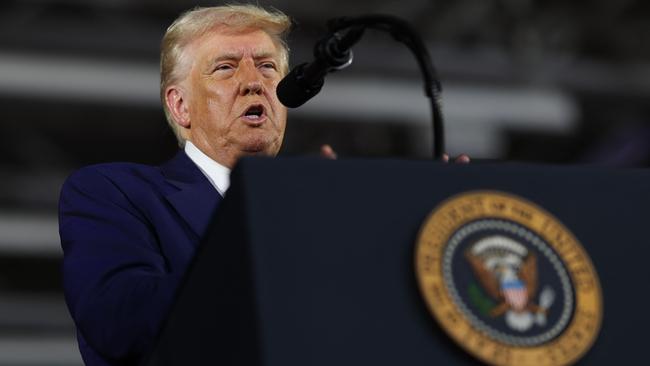Australian investors defy ESG backlash for now as Vanguard ethically conscious funds flow in
Investors are ripping record amounts of money from sustainable funds overseas, but Australians are still pouring hundreds of millions into ethical and green funds. Can it last?

Investors are ripping record amounts of money from sustainable funds overseas, but in Australia investors appear to be defying the ESG backlash, for now at least.
Investors added $US300m to Australian and New Zealand sustainable funds in the three months to the end of March, according to Morningstar. That’s a small decline on the prior quarter but still in positive territory. And while April’s final numbers are not yet in, ETF providers told The Australian the flows into ESG funds look positive for that month too.
The Vanguard Ethically Conscious International Shares and the Vanguard Ethically Conscious Australian Shares are among the funds that saw inflows in April, even as Donald Trump waged war on global trading partners.
This is very different to the scene in the US, Europe and Asia, where investors pulled a record $US8.1bn from sustainable funds in the first three months of the year.
With Trump leading the anti-climate agenda, it’s no surprise US sustainable funds suffered the most outflows. Investors pulled a record $US6.1bn from US sustainable funds in the last quarter alone.
In Europe, the reversal out of green funds, at $US1.2bn, was smaller but even more stark because it’s the first time investors in the region were net sellers, according to Morningstar. The US is already on its 10th quarter of net outflows, with the anti-climate, “anti-woke” movement gathering pace.
Europe, long the powerhouse of green investing, is still the biggest region for ESG funds, accounting for $US2.67 trillion of the total $US3.16 trillion invested in green ETFs globally. Australia accounts for a measly 1 per cent, with just $US30bn invested in sustainable funds in the local market.

The small exposure could explain why Australian investors appear in no rush to ditch their green holdings.
But that may soon change. Morningstar Sustainalytics’ Michelle Cameron says investor appetite for ESG funds will be tested in the coming months.
It’s partly because investors are now eyeing a much more challenged environment to get decent returns from ESG funds.
“While Australia and New Zealand have remained resilient, the region is showing signs that it is unlikely to remain immune, with fund launches in the region dropping to their lowest levels since 2021, signalling potentially further declining flows ahead,” she says.
Crucial, however, is the move by European investors to pull money from ESG funds – remember, these are the biggest supporters of the green movement: This is clearly a sign that the US-led pushback against the green agenda, as well as diversity, equity and inclusion (DEI), is spreading.
“The quarter signals a shift, not just in flows, but in how sustainable investment strategies are being perceived and positioned in the market,” says head of sustainable investing research at Morningstar, Hortense Bioy.
“We’re seeing further signs of consolidation, rebranding activity and cautious product development, amid an intensifying ESG backlash in the US which is now also noticeably affecting sentiment in Europe,” Bioy says.
“Investor appetite for ESG funds will continue to be tested in the months ahead by an evolving regulatory landscape and mounting geopolitical tensions.”
The shift to an anti-climate agenda is spilling over into the mainstream environment too.
Already, some of Australia’s largest investment houses – the majors super funds – have indicated a shift in their thinking on climate investing and net zero targets.
Industry fund Cbus has already warned that it may water down its climate targets and shift how it engages with companies on sustainability due to the anti-ESG movement.
Like others, the construction industry super fund has been watching the retreat from climate pledges by US companies, with the push against ‘‘woke’’ capitalism in turn potentially leading to the fund revisiting its own climate targets and objectives.
“Our targets are very much in the context of real world decarbonisation,” outgoing chief investment officer Brett Chatfield told The Australian earlier this year.
Likewise, Australian Retirement Trust, which has pledged to reduce emissions by 2030 and be at net zero by 2050, suggests its climate targets could be adjusted “based on updated information”.
Fund closures pose further challenges for fund inflows into sustainable strategies.
In Australia and New Zealand, there were five sustainable fund closures between January and late March.
About 94 European products were liquidated or merged, while US fund closures reached a new quarterly high of 20.
Morningstar believes the drivers behind the closures during 2024 and 2025 were a function of several variables, including underperformance against market winners such as the US tech titans inside the Magnificent Seven; uncertainty around the impacts of policies out of the US; and closer regulatory scrutiny of “greenwashing”.
ETF provider Betashares says a global shake-out is under way as part of the regulatory crackdown on faux green labels.
“In a world awash with geopolitical challenges and under actual or anticipated action from regulators, managers have changed the name of or withdrawn products whose ESG credentials were marginal at best,” Betashares responsible investment director Greg Liddell says.
“In the next few years, we expect a realignment in ethical investing, as investors trend back towards robust investment solutions that provide a true-to-label ESG exposure.”






To join the conversation, please log in. Don't have an account? Register
Join the conversation, you are commenting as Logout